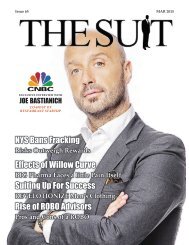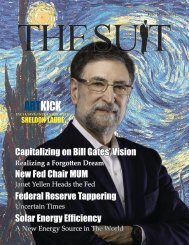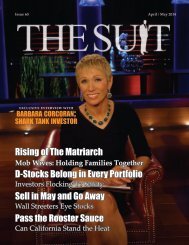o_19grqq7snim9mn019q11f7ds26a.pdf
Marcus Lemonis, a serial entrepreneur and host of the show “The Profit” on CNBC, is a true survivor in the corporate world. The native-born Lebanese business man endured the chaos of a civil war in Beirut and eventually moved to Miami. Lemonis was exposed to the automotive industry throughout his upbringing - his grandfather owning two of the largest Chevrolet dealerships in the United States and Lee Iacocca serving as the family friend and later mentor to Lemonis. On page 12, we conducted an interview with “Profit” host Marcus Lemonis, who offers struggling small businesses capital investment and his expertise in exchange for an ownership stake in the company. In the latter part of the magazine, we interviewed countless wealth advisors during these tough economic times. We recognize that some of the changes in 2013 and 2014 require relevance for financial planners. Therefore, the financial industry continues to push for more realistic standards and reforms.
Marcus Lemonis, a serial entrepreneur and host of the show “The Profit” on CNBC, is a true survivor in the corporate world. The native-born Lebanese business man endured the chaos of a civil war in Beirut and eventually moved to Miami. Lemonis was exposed to the automotive industry throughout his upbringing - his grandfather owning two of the largest Chevrolet dealerships in the United States and Lee Iacocca serving as the family friend and later mentor to Lemonis. On page 12, we conducted an interview with “Profit” host Marcus Lemonis, who offers struggling small businesses capital investment and his expertise in exchange for an ownership stake in the company. In the latter part of the magazine, we interviewed countless wealth advisors during these tough economic times. We recognize that some of the changes in 2013 and 2014 require relevance for financial planners. Therefore, the financial industry continues to push for more realistic standards and reforms.
Create successful ePaper yourself
Turn your PDF publications into a flip-book with our unique Google optimized e-Paper software.
y judy magness<br />
The Complications of<br />
EMPLOYMENT LAW<br />
Employment law is complex and constantly<br />
changing. It’s essential companies stay<br />
compliant with myriad regulations to avoid<br />
penalties and other repercussions.<br />
Consider, for example, the “banthe-box”<br />
movement, which<br />
seeks to create a fairer playing<br />
field for people with a criminal past<br />
who are applying for jobs. According<br />
to the National Employment Law<br />
Project (NELP), 12 states have adopted<br />
legislation to remove the checkbox<br />
on job application forms asking an<br />
applicant about any prior convictions.<br />
Delaware and Nebraska are the latest<br />
states to embrace this policy, while<br />
California (which signed on in 2013) is<br />
slated to begin enforcing the ordinance<br />
this July.<br />
Attorney Melinda Garcia,<br />
shareholder at the employment law<br />
firm of Garcia & Gurney in Pleasanton,<br />
CA, asserts that ban-the-box laws<br />
will have minimal impact, although<br />
employer hiring costs could increase<br />
because the process may take a little<br />
longer. In contrast, “banning the box”<br />
would be an advantage for applicants<br />
with a one-time DUI on their records<br />
from years ago. Garcia calls this a stale<br />
offense. “Practically speaking, I don’t<br />
think it will make much of a difference<br />
in hiring practices,” she said. “But it<br />
will make people applying for the job<br />
feel better.”<br />
Movements like this represent<br />
only one aspect of employment law.<br />
Legal issues surrounding employer<br />
healthcare plans are emerging as<br />
companies incorporate the mandates<br />
of the Affordable Care Act (ACA) or<br />
“Obamacare.” Garcia foresees that<br />
some employers will use staffing<br />
companies or professional employer<br />
organizations (PEO) to outsource staff<br />
so that they stay under 50 employees,<br />
making them exempt from certain<br />
THE SUIT MAGAZINE - JULY 2014<br />
ACA requirements. But she also<br />
predicts that the government will<br />
quash this strategic move. “Reading<br />
the tea leaves, I think that there will<br />
be some legislation to punish those<br />
employers and make such a practice<br />
illegal. But then the government will<br />
have the problem of proving pretense,”<br />
she said.<br />
The misuse of independent<br />
contractors is another hot topic in<br />
employment law. “A company using<br />
independent contractors who is not<br />
working with the counsel and guidance<br />
of an attorney on a regular basis may<br />
find itself in trouble,” said Garcia.<br />
“The penalties for misclassifying<br />
independent contractors are huge, not<br />
only state and federal penalties, but<br />
also the taxes and interest. There could<br />
also be criminal penalties.” She advises<br />
clients to work with their accountants<br />
and legal counsel to best determine<br />
whether someone should be classified<br />
as an independent contractor or as an<br />
employee.<br />
Garcia & Gurney remains steadfast<br />
in keeping its clients compliant with<br />
regulatory changes in employment<br />
law, business litigation and intellectual<br />
property protection. The firm is also<br />
invested in helping clients grow their<br />
businesses. Just recently, they designed<br />
legal service packages, offered at a flat<br />
fee instead of an hourly rate, to address<br />
both compliance issues and company<br />
growth for qualified clients.<br />
www.garciagurney.com










